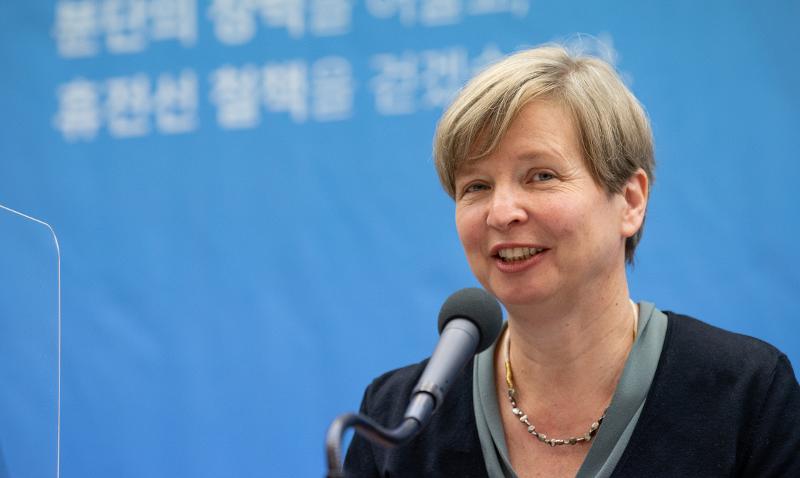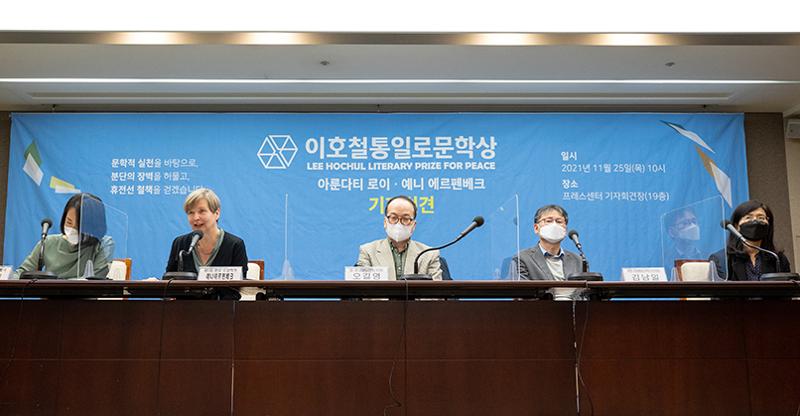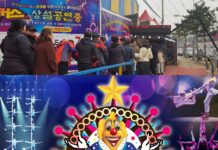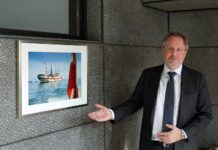
Jenny Erpenbeck, a German writer who won the main award of the fifth Lee Hochul Literary Prize for Peace, on Nov. 25 gives her acceptance speech at a news conference held at Korea Press Center in Seoul’s Jung-gu District.
By Min Yea-Ji and Lee Jihae
Photos = Kim Sunjoo
A writer born in the former East Germany whose literary career reflects her contemplation of her homeland’s division is the main winner of the fifth Lee Hochul (Ho-cheol) Literary Prize for Peace.
Jenny Erpenbeck is known for her critical and balanced views of the problems of socialism in East Germany and the limits of capitalism in West Germany based on her experiences. Her main works include “Visitation” (2008) and “The End of Days” (2012).
“(With this award), I am delighted over my deep and moving impression of the difficult and eventful history of Korea,” she told a news conference on Nov. 25 at the Korea Press Center in Seoul’s Jung-gu District. “What is clear is that the experience of living in a divided country affected writer Lee Ho-cheol’s works as it did mine.”
Throughout his life, Lee (1932-2016) wrote about the themes of division and reunification, with his works reflecting his life in which he endured the pain of the Korean War and national partition.
Erpenbeck said, “Living with a border and having families live across that border whose daily lives are separated against their will make the meaning of division completely different for certain people,” adding, “It makes one feel how much this dividing line that separates families, language and even a unique culture intervenes in the path of an individual’s life.”
The writer said families who pined for each other during Germany’s separation reunited after the country’s reunification and had daily life restored, adding that they felt an “expansion of cultural space” but that much had also changed at the same time.
If Korea reunifies, she said, neither side should be arrogant and both sides should try to understand each other on an equal standing.
“Throughout life, I’ve never taken for granted falling asleep peacefully at night and waking up peacefully in the morning,” she said. “The war that our great grandparents, grandparents and parents endured is embedded deeply in our bones.”
“Through writing, I will try eradicating the loneliness of these people.”
Kim Nam-il, chair of the award’s selection committee, said of “The End of Days,” “Custom and law, violence and war, exile and genocide — it is very evident that the serious interest and affection the author showed to the survivors/or dead on the European continent who could endure/or not endure the unbearable narrative is in line with the values pursued by the Lee Hochul Literary Prize for Peace.”
Seoul’s Eunpyeong-gu District Office commemorates the literary activities of Lee Ho-cheol, who wrote in the district for 50 years, and his wish for Korean reunification. Founded in 2017, the annual honor recognizes literature on reunification, with the main honor comprising a medal and cash prize of KRW 50 million.

German writer Jenny Erpenbeck (second from left), the main winner of the fifth Lee Hochul (Ho-cheol) Literary Prize for Peace, on Nov. 25 gives her acceptance speech at a news conference held at Korea Press Center in Seoul’s Jung-gu District. The late Lee was a leading literary writer on the division of the Korean Peninsula and post-Korean War era.
jesimin@korea.kr







![[K-brand-promoting ethnic Koreans ⑤] Spreading taekwondo ‘spirit’ in Singapore](https://gangnam.com/file/2024/02/20231129124433000_ENU3D0FB-218x150.png)















